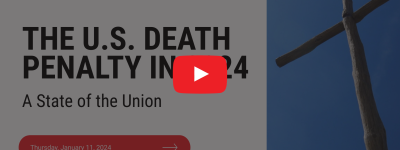UPDATE August 8, 2022 | Judge set to determine constitutionality of South Carolina's execution methods
Following the conclusion of last week’s four-day bench trial in South Carolina, a judge will now determine the constitutionality of the state’s execution methods. The trial, which centered around the various ways South Carolina has attempted to carry out executions, took place after the state’s failed attempts to resume executions earlier this Spring following the passage of 2021 law that requires individuals facing execution to choose between the electric chair or firing squad if lethal drugs are not available.
UPDATE May 5, 2022 | After Richard Moore elected to die by firing squad over electrocution, the South Carolina Supreme Court issued him a temporary stay of execution. The state later announced a May 13, 2022 execution date for Brad Keith Sigmon, which has also been stayed.
Read the Diocese of Charleston's statement >>
April 14, 2022 | South Carolina plans to resume executions for the first time in over 10 years. The state has scheduled the execution of Richard Moore for April 29, 2022.
Like other jurisdictions, South Carolina has struggled to obtain lethal injection drugs in recent years, as a growing number of pharmaceutical companies have refused to sell their products to correctional facilities for the purpose of executions.
As a result, in May 2021 South Carolina Governor Henry McMaster signed into law a bill requiring individuals facing execution to choose between the electric chair or firing squad if lethal drugs are not available.
The firing squad has never before been an approved execution method in South Carolina, and the procedures for its use have only recently been created. The state recently spent $53,600 refurbishing their death chamber to accompany this new execution method.
In the absence of a choice, the state will default to the electric chair.
The Catholic Diocese of Charleston released a statement on April 8, 2022 calling South Carolina’s backslide into executions “modern-day barbarism.”
Mr. Moore’s defense team is currently challenging whether these methods constitute cruel and unusual punishment, which is barred in the U.S. by the 8th Amendment.



